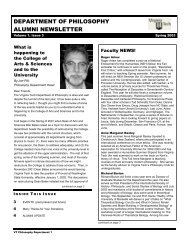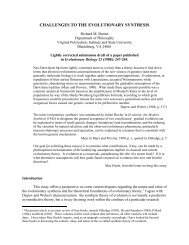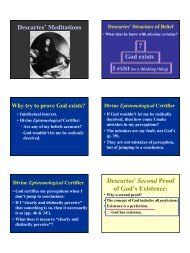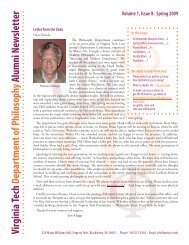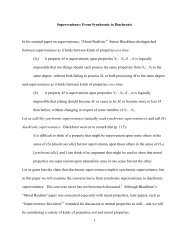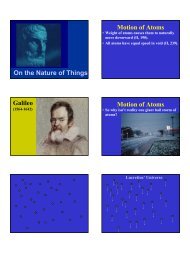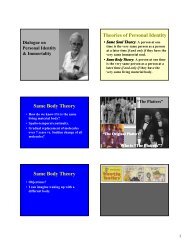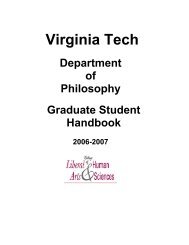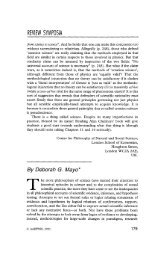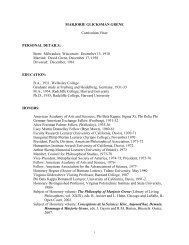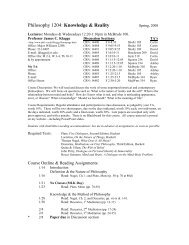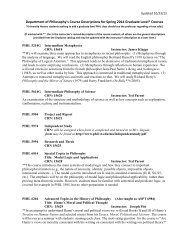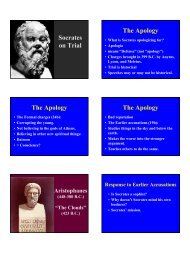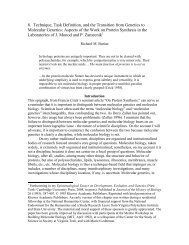Wittgenstein in Exile
Wittgenstein in Exile
Wittgenstein in Exile
You also want an ePaper? Increase the reach of your titles
YUMPU automatically turns print PDFs into web optimized ePapers that Google loves.
An alternative possible explanation for <strong>Wittgenste<strong>in</strong></strong>’s <strong>in</strong>terest and trip to Russia has been raised <strong>in</strong><br />
a very speculative way by Kimberley Cornish, <strong>in</strong> his book The Jew of L<strong>in</strong>z (London: Century, 1998), where<br />
he proposes that <strong>Wittgenste<strong>in</strong></strong> was a Stal<strong>in</strong>ist sympathizer and recruiter. This would be <strong>in</strong>compatible with<br />
my account here.<br />
23 See <strong>Wittgenste<strong>in</strong></strong>’s diary entry of 4.4.37 (“Movements of Thought,” PPO, p. 237) while <strong>in</strong> Norway: “I<br />
sometimes consider whether I should leave here now already. For example: first to Vienna for a month,<br />
then to England for a month—or longer—then to Russia. And then return here?—Or to Ireland?”; and his<br />
last letter to Engelmann (21.6.37): “I am now <strong>in</strong> England for a short stay; perhaps I shall go to Russia. God<br />
knows what will become of me.” And von Hayek’s memoir of <strong>Wittgenste<strong>in</strong></strong>, “Remember<strong>in</strong>g My Cous<strong>in</strong>,<br />
Ludwig <strong>Wittgenste<strong>in</strong></strong>,” recounts that after World War II <strong>Wittgenste<strong>in</strong></strong> had visited Soviet-occupied Vienna:<br />
“He then engaged me <strong>in</strong> the most lively conversation, beg<strong>in</strong>n<strong>in</strong>g with his impressions of the Russians at<br />
Vienna, an experience which evidently had shaken him to his depth and destroyed certa<strong>in</strong> long-cherished<br />
illusions” (<strong>in</strong> Flowers, v. 1, p. 129).<br />
24 The tension between civilization and culture haunted <strong>Wittgenste<strong>in</strong></strong>’s homelife as well. His father, who<br />
represented progressive Western civilization, died <strong>in</strong> 1913. His mother, whose musical talents could have<br />
symbolized the lost Western culture, died <strong>in</strong> 1926. Yet dur<strong>in</strong>g the thirteen years of her widowhood<br />
<strong>Wittgenste<strong>in</strong></strong> was most pa<strong>in</strong>fully estranged from his family. See McGu<strong>in</strong>ness, pp. 28 and 22; and Monk, p.<br />
235.<br />
25 The Judaeans <strong>in</strong> exile, however, were allowed to return home by the Persians after their defeat of the<br />
Babylonians. Many, but not all, did. Spengler discusses this <strong>in</strong> vol. II, p. 207.<br />
26 I believe Spengler’s thoughts on the mechanistic philosophy of our times do <strong>in</strong>fluence <strong>Wittgenste<strong>in</strong></strong>’s<br />
th<strong>in</strong>k<strong>in</strong>g about the nature of causality. For more about this, see my papers: “<strong>Wittgenste<strong>in</strong></strong> on Non-<br />
Mediative Causality,” Journal of the History of Philosophy, October, 1999; and “The Puzzle of Goethe’s<br />
Influence on <strong>Wittgenste<strong>in</strong></strong>.”<br />
27 Zettel 455.<br />
28 R. Rhees, “Postscript,” <strong>in</strong> Recollections of <strong>Wittgenste<strong>in</strong></strong>, p. 208.<br />
29 C&V, p. 17/24.<br />
30 Monk, p. 498. <strong>Wittgenste<strong>in</strong></strong>’s puzzl<strong>in</strong>g attitude towards Ramsey is elaborated <strong>in</strong> his diary entry of<br />
27.4.30 <strong>in</strong> “Movements of Thought,” PPO, pp. 15-7.<br />
31 PI 123<br />
32 <strong>Wittgenste<strong>in</strong></strong>’s Lectures on the Foundations of Mathematics: Cambridge, 1939, ed. C. Diamond, Ithaca:<br />
Cornell University Press, 1976, p. 44. And similarly, the notes of lectures <strong>in</strong> Gask<strong>in</strong>g and Jackson,<br />
“<strong>Wittgenste<strong>in</strong></strong> as a Teacher,” <strong>in</strong> Ludwig <strong>Wittgenste<strong>in</strong></strong>: The Man and His Philosophy, ed. K. Fann, New<br />
York: Prometheus, 1967, pp. 49-55. Cf. also the comparison of language to the streets of an ancient city<br />
(PI 18); and the comparison of philosophical confusions to geographical misconceptions (PO p. 185).<br />
33 And if be<strong>in</strong>g a good philosopher requires be<strong>in</strong>g an exile, it is understandable that <strong>Wittgenste<strong>in</strong></strong><br />
encouraged his students to f<strong>in</strong>d work outside of philosophy.<br />
34 Monk, p. 351.<br />
35 C&V, p. 15/22 (1931), and PO pp. 185-7.<br />
36 PO p. 199.<br />
37 PO p. 195.<br />
38 Accord<strong>in</strong>g to Desmond Lee (p. 192 <strong>in</strong> Flowers, v. 2) <strong>Wittgenste<strong>in</strong></strong> “said once that one of the great<br />
drawbacks to a teacher’s life was that he was work<strong>in</strong>g always for a future he never saw, and that he was<br />
constantly hav<strong>in</strong>g to deal with a new generation of pupils; no endur<strong>in</strong>g visible result, only constantly<br />
chang<strong>in</strong>g generations.”<br />
39 C&V p. 61/70 (1947).<br />
40 From the same passage quoted above. And cf. Remarks on the Foundations of Mathematics, p. 132; and<br />
“Movements of Thought,” PPO, p. 169.<br />
41 Or for the supposed <strong>in</strong>evitable irrelevance of science to philosophy—an issue I address <strong>in</strong> “<strong>Wittgenste<strong>in</strong></strong><br />
and Neuroscience,” Synthese, March, 1989.<br />
42 In discussion after this paper was presented, Cora Diamond suggested that perhaps the illiterate peasantsoldier<br />
Platon, <strong>in</strong> Tolstoy’s War and Peace, would be immune to philosophical problems.<br />
43 Cf. <strong>Wittgenste<strong>in</strong></strong>’s feel<strong>in</strong>g, while a teacher <strong>in</strong> Lower Austria, that he had been “called” but had refused.<br />
See Monk’s <strong>in</strong>terest<strong>in</strong>g discussion of this and related material at pp. 199-200.<br />
15



